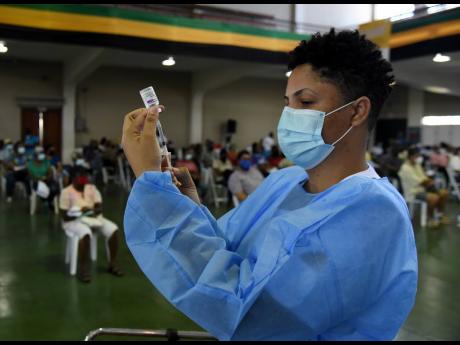MIX & MATCH VAX
Gov’t studying possibility of COVID combo vaccinations
The Jamaican Government is keenly studying the prospect of administering different vaccine brands to inoculate persons against COVID-19, signalling the reversal of a previous declaration as the science evolves. Jamaica is still awaiting an official...
The Jamaican Government is keenly studying the prospect of administering different vaccine brands to inoculate persons against COVID-19, signalling the reversal of a previous declaration as the science evolves.
Jamaica is still awaiting an official ruling from the World Health Organization (WHO) on the emerging practice that could ease the second-dose crisis and supply shortages that have forced the island to curb its roll-out.
Vaccine czar Dr Melody Ennis said that health officials are reviewing a report out of Canada but are holding off making an official decision.
“We continue to take recommendation and directives from the World Health Organization, and that is through their strategic advisory group of experts. That recommendation has not been made at this time, so we have not considered it because we have not seen any documentation from that authority regarding same,” said Ennis, director of family health services at the Ministry of Health & Wellness.
Ennis, who heads the country’s immunisation programme, said the ministry will continue to monitor the evidence.
There is growing global interest in the mix-and-match strategy, which is referred to as heterologous prime and boost immunisation.
Several countries, including Canada, Spain, Italy, Bahrain, and South Korea, have gone ahead and advised that those already primed with one vaccine can receive an alternative brand for their second dose. Other countries, including the United States, the United Kingdom, and Russia, are currently conducting studies to evaluate the safety and efficacy of mixing vaccines.
WHO chief scientist Dr Soumya Swaminathan said the method seems to be working well.
“This opens up the opportunity for countries that have vaccinated people with one vaccine and now are waiting for the second dose they have run out of, to potentially be able to use a different platform vaccine,” she was quoted as saying in a Business Today report on Monday.
Swaminathan cited data from the UK, Spain, and Germany indicating that a mix-and-match regimen involving two different types of COVID-19 vaccines generates more robust immune response – that is, higher levels of virus-blocking antibodies and white blood cells that kill virus-infected cells.
Professor of public health, epidemiology and HIV/AIDS at The University of the West Indies, Mona, Dr Peter Figueroa, said WHO is reviewing various studies and the results as they become available. Figueroa is a member of the WHO’s COVID-19 Working Group on Vaccines.
“Many experts are optimistic that we will be able to mix and match different vaccines and the person would still be protected,” he told The Gleaner on Monday.
“There are a number of studies going on, including in the UK and elsewhere. There are studies that include the AstraZeneca and the Pfizer, the AstraZeneca and the Sputnik, as well as others,” said the public health expert.
Figueroa, who also heads the Caribbean Immunization Technical Advisory Group, said that Caribbean countries would most likely wait on the WHO’s blessing before issuing their own advisory.
“I am not aware of any actual studies going on in the Caribbean on that, but some countries may take the decision to go ahead, given the challenges that they are facing in getting vaccines,” he said.
Jamaica’s vaccination programme has been hampered by the global shortage of vaccines, as wealthier countries stockpile hundreds of millions of doses, starving poorer countries of immunity. The country was forced to put a hold on the vaccination of persons under 50 because of the supply challenges.
Chairman of the National Health Fund, Howard Mitchell, said that 3,000 doses of AstraZeneca vaccines are expected by Wednesday, while a shipment of 35,800 doses, from “friendly governments”, should arrive by Saturday.
Another 93,000 doses of AstraZeneca are expected from the COVAX Facility by month-end.
“I am also hopeful that the United States will give its approval for the shipment of some soon-to-expire vaccines, but I can’t say when or how many,” Mitchell said.
The US has committed to donating millions of doses of COVID-19 vaccines to Latin America and the Caribbean as domestic demand falls. Doses will come from existing production of Pfizer, Moderna, or Johnson & Johnson stock, making this the first time that US-controlled vaccines authorised for use in the country will be shared overseas.
Jamaica is also expected to receive its first shipment of Johnson & Johnson vaccine in August. The Government has paid down just over $350 million for 1.9 million doses of the vaccine, which will be delivered over several months. Those now awaiting their second doses were given the AstraZeneca vaccine.
The country recorded 1,034 COVID-19 deaths up to Sunday and had 49,712 cases overall.

